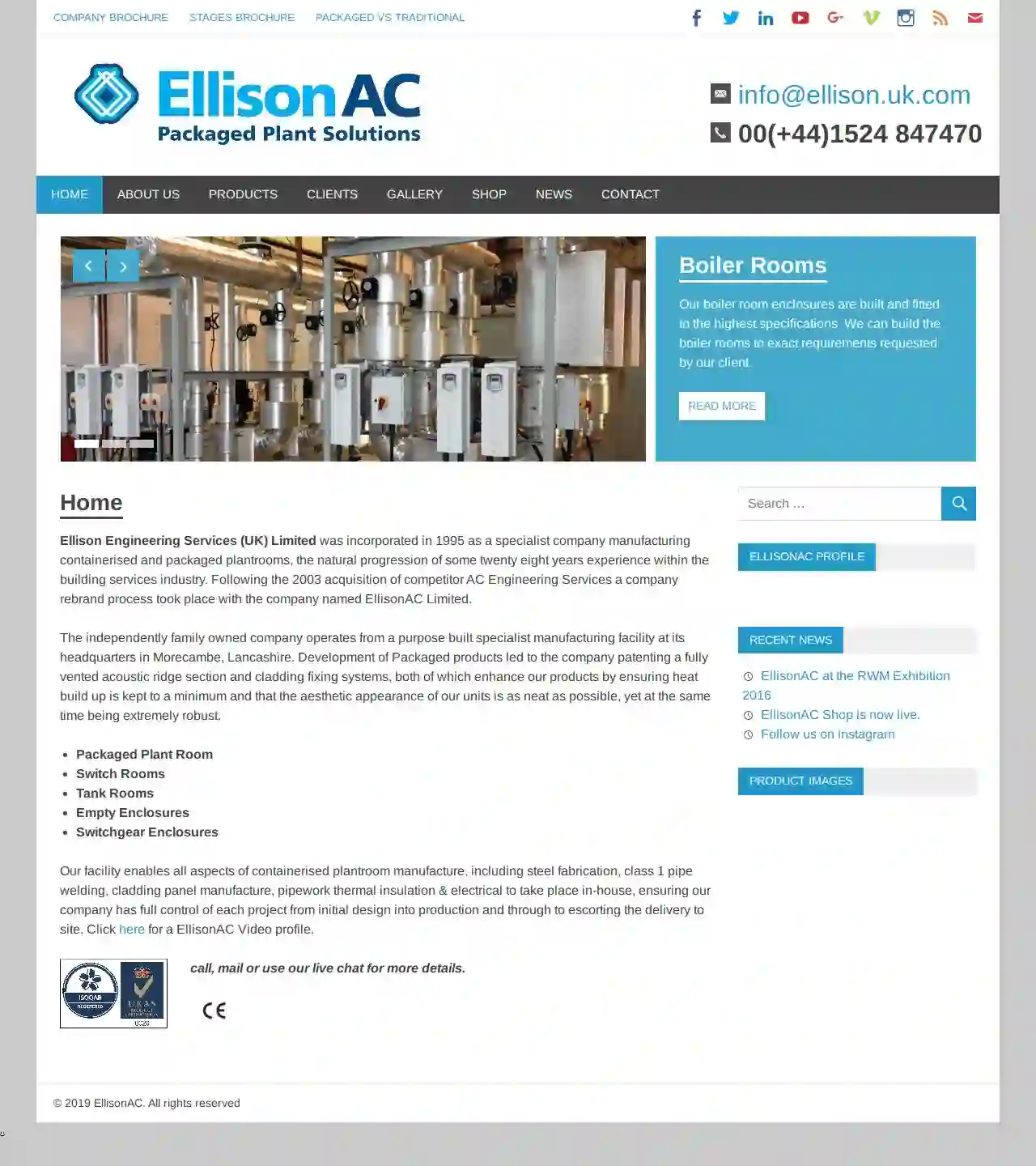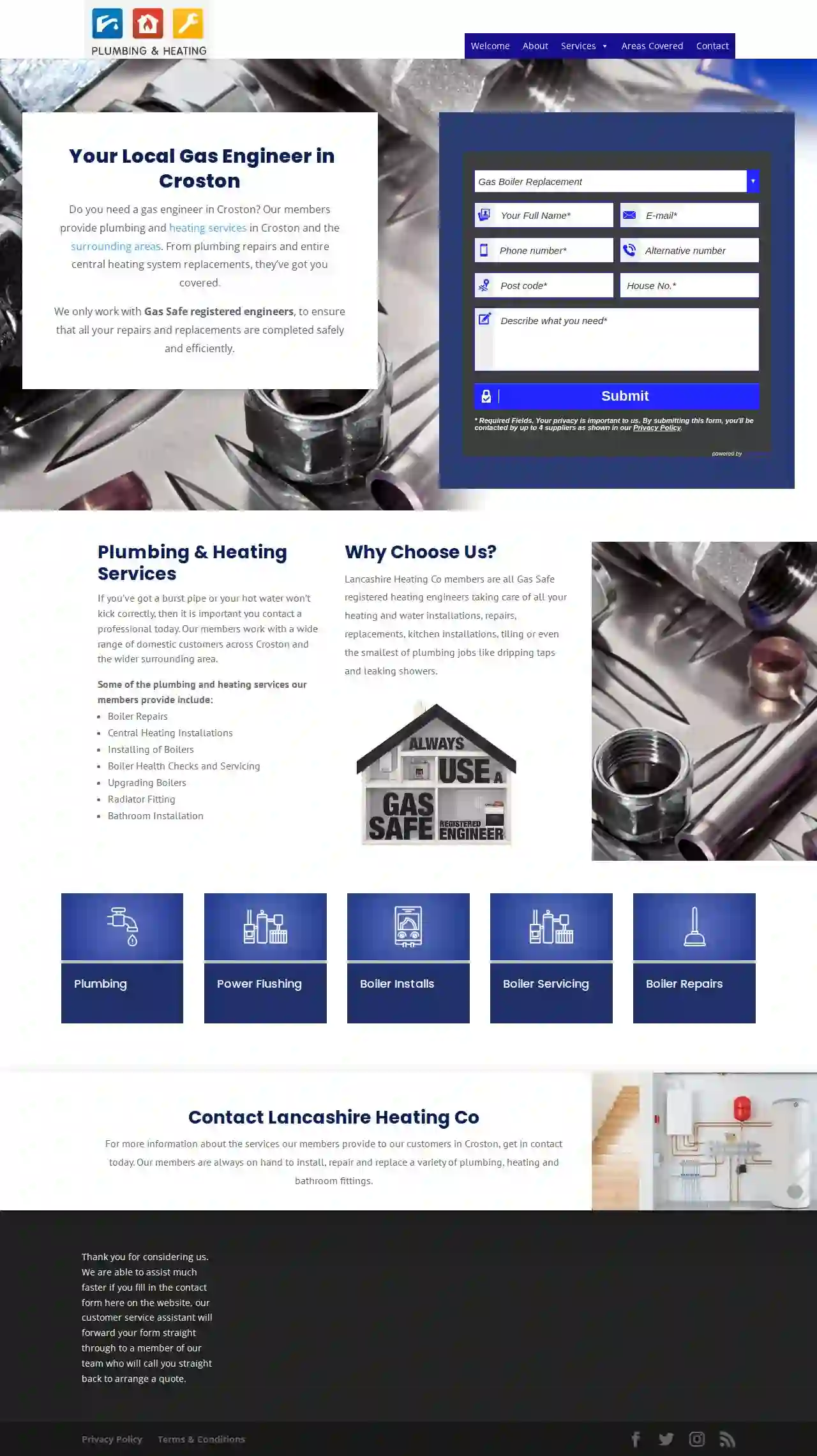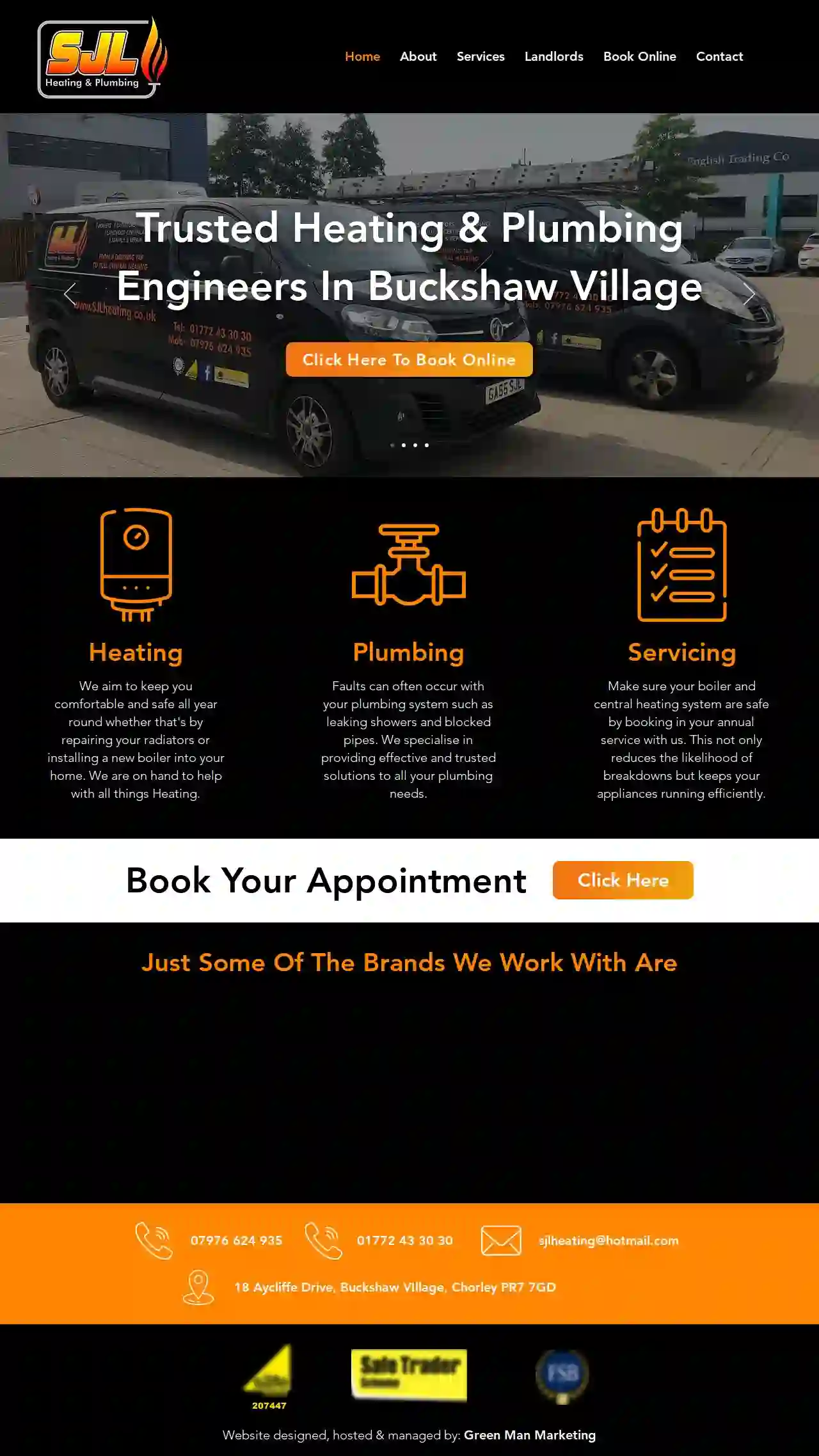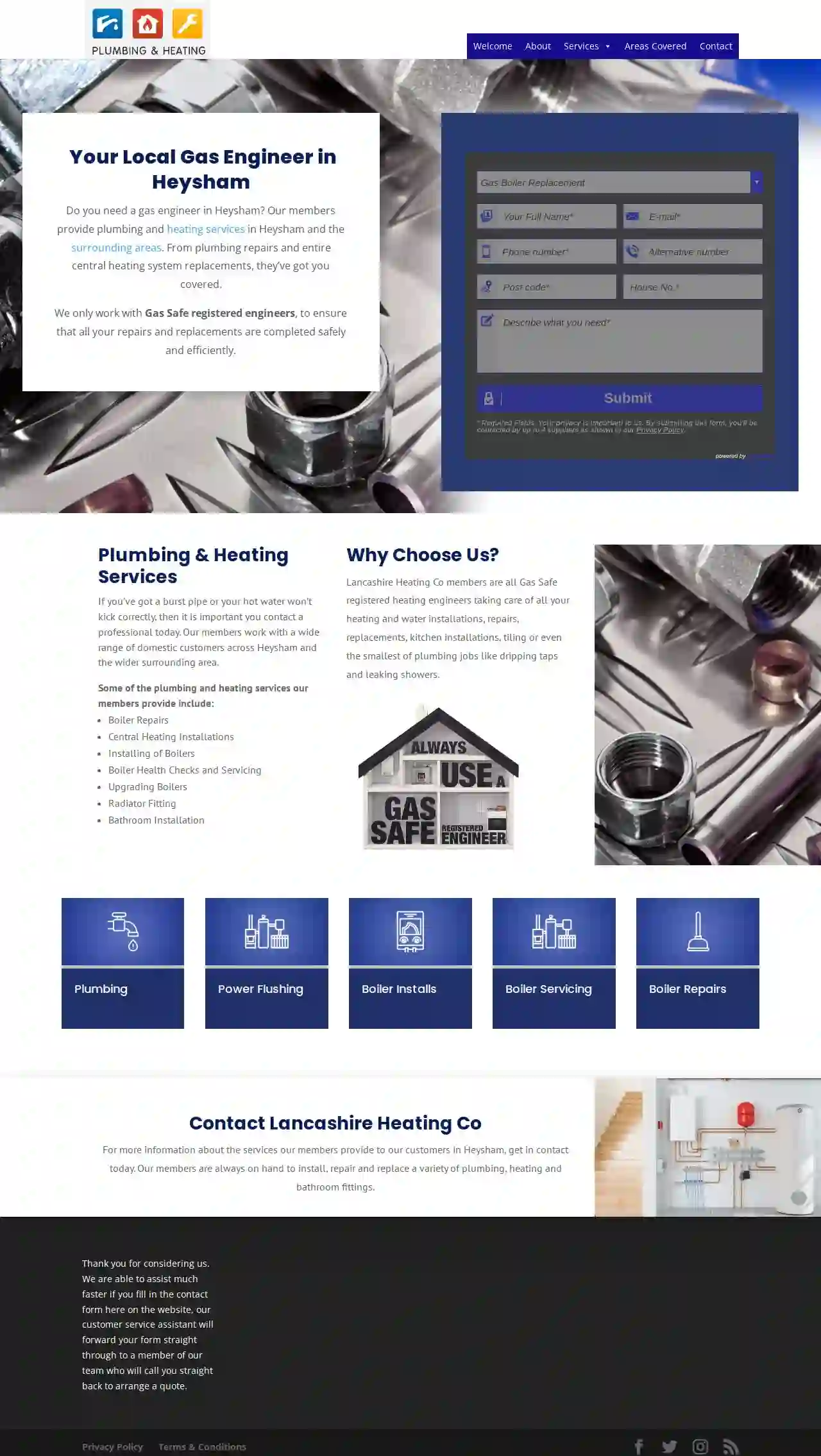Boiler Installation Bamber Bridge
Top Boiler Replacement in Bamber Bridge
Receive 3 FREE New Boiler quotes for your project today! Compare profiles, reviews, accreditations, portfolio, etc... and choose the best offer.

Ellison AC Packaged Plant Solutions
4.86 reviewsMorecambe, GBEllison Engineering Services (UK) Limited was incorporated in 1995 as a specialist company manufacturing containerised and packaged plantrooms, the natural progression of some twenty eight years experience within the building services industry. Following the 2003 acquisition of competitor AC Engineering Services a company rebrand process took place with the company named EllisonAC Limited. The independently family owned company operates from a purpose built specialist manufacturing facility at its headquarters in Morecambe, Lancashire. Development of Packaged products led to the company patenting a fully vented acoustic ridge section and cladding fixing systems, both of which enhance our products by ensuring heat build up is kept to a minimum and that the aesthetic appearance of our units is as neat as possible, yet at the same time being extremely robust. Our facility enables all aspects of containerised plantroom manufacture, including steel fabrication, class 1 pipe welding, cladding panel manufacture, pipework thermal insulation & electrical to take place in-house, ensuring our company has full control of each project from initial design into production and through to escorting the delivery to site.
- Services
- Why Us?
- Gallery
Get Quote
Crw Plumbing and Gas services LTD
514 reviews2 Owen Road, Lancaster, LA1 2AR, GBCRW Plumbing & Gas Services Ltd is a well-established, family run plumbing and gas company based in Lancaster with over 15 years experience. We cover all areas of Lancashire and Cumbria, also taking on work further afield. Here at CRW we welcome a challenge and pride ourselves on our quality of work, no job is too big or too small. We are fully qualified Hetas engineers and all our work is carried out to the highest standard. We install all types of gas, electric and multi-fuel fires to the highest of safety standards. We can repair, replace and install full central heating systems. We can alter, repair and design existing or new bathrooms suites. We are a family run business with a team of experienced plumbers and gas engineers.
- Services
- Why Us?
- Our Team
- Testimonials
- Gallery
Get Quote
D T S M Ltd
51 reviewsLeyland, GBLancashire Heating Co provides plumbing and heating services in Lancashire and the surrounding areas. Our members are Gas Safe registered engineers, ensuring all repairs and replacements are completed safely and efficiently. We offer a range of services, including boiler repairs, central heating installations, boiler health checks and servicing, upgrading boilers, radiator fitting, and bathroom installation. Our team is dedicated to providing excellent customer service and ensuring that all our customers receive the highest level of workmanship and professionalism.
- Services
- Why Us?
- Gallery
Get Quote
North West Climate Service Ltd
11 reviewsUnit 1, Kingfisher Court, Sandwash Close, Rainford, St Helens, Merseyside, WA11 8LY, GBNorth West Climate Services (NWCS Ltd.) is a one-stop climate service specialist that has been operating within the industry for over 10 years. We have an abundance of knowledge to assist you when choosing what would be the most suitable system to suit your needs. Our services include the supply and installation of Air Conditioning Systems, Refrigeration, Heating and Ventilation, Cellar Cooling, Glycol Cooling Systems, Repair, Service and Maintenance, Electrical, and Site Management. We pride ourselves on providing consistently high-quality services to our client base, which has led to us achieving preferred supplier status with many of them. Our high level of repeat business from our valued clients is a testament to our company ethos.
- Services
- Why Us?
- Gallery
Get Quote
Jk engineering project Ltd, Gas Heating, Plumbing & Electrical
Unit 4, Cockers Farm House, Long Lane, Heath Charnock, Chorley, Cockers Farm House Long Lane, PR6 9EE, GBJK Engineering Projects Ltd are commercial and domestic plumbers and gas engineers, working on projects of all sizes across the UK. With over 20 years in the plumbing and heating trade, we have the knowledge and skills needed to undertake all aspects of commercial, industrial and domestic plumbing and heating. Our team of highly experienced, registered engineers regularly install central heating systems, bathrooms, and undertake all aspects of plumbing and boiler servicing and repairs for our clients throughout the UK. We pride ourselves on our unbeatable customer service, and aim to always ‘fix it right, first time.’ This is our ethos in every single job we attend, whether it’s installing a new boiler or simply replacing a leaky tap.
- Services
- Why Us?
- Accreditations
- Gallery
Get Quote
SJL Heating & Plumbing
4.468 reviews18 Aycliffe Drive, Buckshaw Village, PR7 7GD, GBSJL Heating are your trusted heating and plumbing engineers in Buckshaw Village. We aim to keep you comfortable and safe all year round, whether that's by repairing your radiators or installing a new boiler into your home. We are on hand to help with all things Heating and Plumbing. We specialise in providing effective and trusted solutions to all your plumbing needs, from leaking showers to blocked pipes. Make sure your boiler and central heating system are safe by booking in your annual service with us. This not only reduces the likelihood of breakdowns but keeps your appliances running efficiently.
- Services
- Why Us?
- Gallery
Get Quote
PT Plumb - Emergency Plumber in Burnley
52 reviews10 Willis St, Burnley, BB11 4LU, GBPT Plumb is your trusted emergency plumber in Burnley, providing 24/7 plumbing solutions. Our highly-trained professionals are available for immediate call-outs, ensuring fast and specialist solutions to your plumbing and heating emergencies. We understand the urgency of plumbing issues, and we're dedicated to getting you back to normal as quickly as possible. Whether it's a burst pipe, a leaking faucet, or a complete bathroom overhaul, PT Plumb is here to help. We offer a wide range of services, including plumbing repairs, leak detection, bathroom plumbing, and water line repair. Don't wait for a small problem to become a major disaster. Contact our emergency plumbers on 01282 476035 immediately.
- Services
- Why Us?
- Gallery
Get Quote
Instant Plumbing and Heating
51 reviewsBolton, GBInstant Plumbing and Heating is a family-run business with over 25 years of experience in the plumbing trade. We are Gas Safe Registered and provide a range of services including boiler installation, replacement, and repair, as well as central heating installations and maintenance. Our team of registered gas boiler engineers are experts in gas boiler servicing and repairs, and we have experience working with a variety of boiler brands including Baxi, Main, Intergas, Glowworm, Viessmann, and Worcester. We cover the North West area, including Bolton, Wigan, Leyland, Chorley, Preston, Blackburn, and Lancashire. We offer a 12-month guarantee on all our work and can increase standard warranties to up to 10 years. We are committed to providing a professional, considerate, and pleasant service to all our customers.
- Services
- Why Us?
- Accreditations
- Our Team
- Testimonials
- Gallery
Get Quote
Preston's Heating and Cooling
527 reviewsCincinnati, GBBeing comfortable in your own home is vital. Trust Preston’s to take care of your space. Preston’s Heating and Cooling offers HVAC services in Cincinnati, Ohio. From HVAC winter cleanings to major AC repairs, Preston’s Heating and Cooling covers all of your HVAC needs. Our team is dedicated to providing top-notch service and ensuring your home is comfortable and safe. With years of experience in the HVAC industry, we have the expertise to handle any HVAC issue. Whether you need a new system installed, or your current system repaired, we are here to help. Our goal is to provide exceptional service and build long-lasting relationships with our customers.
- Services
- Why Us?
- Our Team
- Gallery
Get Quote
A M D Heating & Plumbing
52 reviewsMorecambe, GBLancashire Heating Co provides plumbing and heating services in Lancashire and the surrounding areas. Our members are Gas Safe registered engineers, ensuring all repairs and replacements are completed safely and efficiently. We offer a range of services, including boiler repairs, central heating installations, boiler health checks and servicing, upgrading boilers, radiator fitting, and bathroom installation. Our team is dedicated to providing excellent customer service and ensuring that all our customers receive the highest level of workmanship and professionalism.
- Services
- Why Us?
- Gallery
Get Quote
Over 12,692+ HVAC Businesses onboarded
Our HVAC companies operate in Bamber Bridge & surrounding areas!
HVACCompaniesHub has curated and vetted the Best HVAC Contractors near Bamber Bridge. Find a trustworthy contractor today.
Frequently Asked Questions About Boiler Installation
- Combi boilers: Combination boilers provide both heating and hot water on demand , saving valuable space. They are compact, efficient, and well-suited for smaller homes or apartments.
- Condensing boilers: Condensing boilers are highly efficient . They recycle heat from waste gases, improving energy efficiency. Condensing boilers offer long-term savings.
- System boilers: System boilers heat your central heating system directly and store domestic hot water in a separate cylinder. . They are a good option for properties with multiple bathrooms or high hot water demands.
- Regular boilers: Regular boilers, also known as conventional or traditional boilers, are the most traditional type of boiler, and they generally require the most space. They are suitable for larger properties with high hot water requirements and existing pipework.
How do I repressurize my boiler?
What type of boiler is best?
What is a boiler’s AFUE rating?
What is a combi boiler?
How do I repressurize my boiler?
What type of boiler is best?
- Combi boilers: Combination boilers provide both heating and hot water instantly, saving valuable space. They are compact, efficient, and well-suited for smaller homes or apartments.
- Condensing boilers: Condensing boilers are highly efficient . They extract more heat from the fuel by condensing the water vapor in the exhaust gases, thus saving energy. Because of increased efficiency, condensing units can help lower your carbon footprint and reduce heating costs.
- System boilers: System boilers are designed for larger homes and store domestic hot water in a separate cylinder. . They are a good option for properties with multiple bathrooms or high hot water demands.
- Regular boilers: Regular boilers, also known as conventional or traditional boilers, require a separate hot water cylinder, a cold water storage tank, and an expansion tank. They are suitable for larger properties with high hot water requirements and existing pipework.